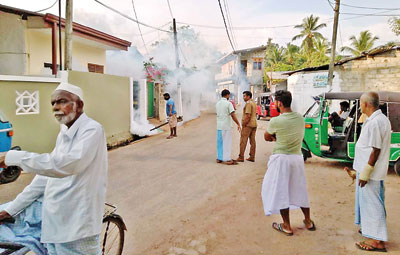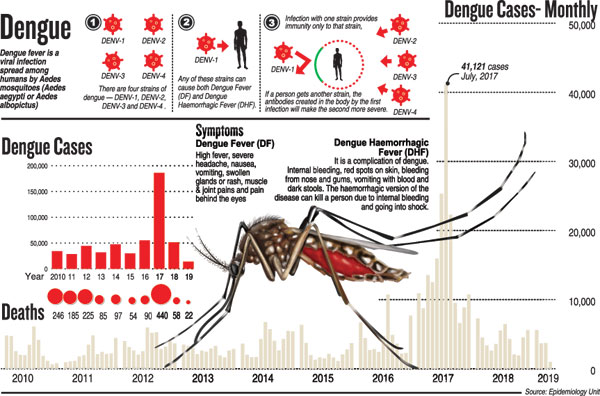News
Brace for an onslaught of dengue virus 3 for which Sri Lanka has no immunity
All indications are that with rains lashing the country and mushrooming construction sites being the ideal breeding grounds for the dengue mosquito, there will be a predominance of DENV3 (Dengue Virus 3), Consultant Paediatrician, Dr. LakKumar Fernando, told the Sunday Times, giving an early warning so that the country can brace for it.
Getting down to the dangerous trends that may emerge this year, Dr. Fernando who facilitated the setting up of the Centre for Clinical Management of Dengue Fever and Dengue Haemorrhagic Fever in Negombo, says that every time a person gets a dengue infection, that person gets lifelong immunity to that strain or serotype. This is while gaining limited ‘cross-immunity’ to the other strains for about six months to one year.

Dr. LakKumar Fernando. Pic by M.A. Pushpa Kumara
Explaining that there are four dengue virus strains or serotypes (DENV1, DENV2, DENV3 and DENV4), he cites the example of Patient A coming down with DENV1. This patient would never get DENV1 again (having lifelong immunity). Patient A would also not get the other three (DENV2, DENV3 and DENV4) for a while – but that would be short-lived, only for a period of about six months to one year. Occasionally, this shorter immunity against the other strains may last for about two years.
However, here comes the “terrible” sting in the bite of the tiny dengue mosquito – the moment that short immunity wears off, if Patient A gets those strains, DENV2, DENV 3 or DENV 4, the virulence of that attack increases in leaps and bounds, the Sunday Times understands.
This second attack of dengue is very likely to manifest in Patient A as Dengue Haemorrhagic Fever (DHF), warns Dr. Fernando.
Thereafter, he looks at the dengue-Sri Lanka inextricable link in the last few years. A major dengue epidemic gripped the country in 2017 and studies carried out to check out the prevalent serotypes found that 90% or more of the patients had been affected by DENV2.
So superimposing the trend of the virus, Dr. Fernando explains that now people have gained lifelong immunity to DENV2. They would also have had a shorter immunity to the other three serotypes, which is now wearing off.
“Remember, even though some people come down with dengue with symptoms, there are numerous others who remain asymptomatic. These are people who have been bitten by the mosquito and have the dengue virus in their systems but do not produce or show symptoms,” he points out, quoting an ‘immunity study’ carried out by the Negombo Dengue Centre and himself along with Senior Consultant Paediatrician Prof. Harendra de Silva and Senior Prof. Nissanka De Silva and Dilakshini Dayananda of the Zoology Department of the Sri Jayewardenepura University.

Several areas in Kalutara were fumigated on Thursday. Pic by Sarath Siriwardene
The study conducted at the end of 2017 and early 2018, looked at household contacts of dengue patients.
“We tested their blood for antigens as well as for antibodies to detect whether they had the virus in them even though they had not shown the symptoms. We found that clinical signs and serological evidence of infection (antigens and antibodies) were negative,” says Dr. Fernando.
The study team had extracted some blood from these participants and fed them to a ‘virgin’ colony of mosquitoes grown in the laboratory and not exposed to the dengue virus earlier. Testing these mosquitoes after a week – which is the dengue incubation period in mosquitoes – the team had found that several of these virgin mosquitoes had become carriers of the dengue infection.
“This reveals that in the larger community, uninfected mosquitoes which take a bite of blood from asymptomatic people would end up becoming dengue-virus carriers,” says Dr. Fernando, showing the extent of the spread of dengue in the country.

| An evidence-based prediction With the intermittent rains, the spectre of dengue rises and is set to reach epidemic proportions, as the people will be prone to DENV3, is the warning from experts. It is not scare-mongering and these experts are speaking with evidence in hand, having studied the serotypes and severity of 100 cases. The study had been conducted by Dr. LakKumar Fernando of the Negombo Dengue Centre and Consultant Virologist Dr. Janaki Abeynayake of the Medical Research Institute (MRI). Of the 100 patients – 36 patients – had DENV3 or Serotype 3 33 patients – had DENV2 or Serotype 2 8 patients – had DENV1 or Serotype 1 4 patients – had both DENV1 and DENV3 1 patient – had DENV1 and DENV2 1 patient – had DENV 2 and DENV 3 17 patients – detections could not be made as blood had been taken too late, after five days of the infection being in the body “Having suffered an attack by DENV2 in 2017, the chances of Sri Lanka facing an epidemic now due to DENV3 are very high,” reiterates Dr. Fernando. | |

